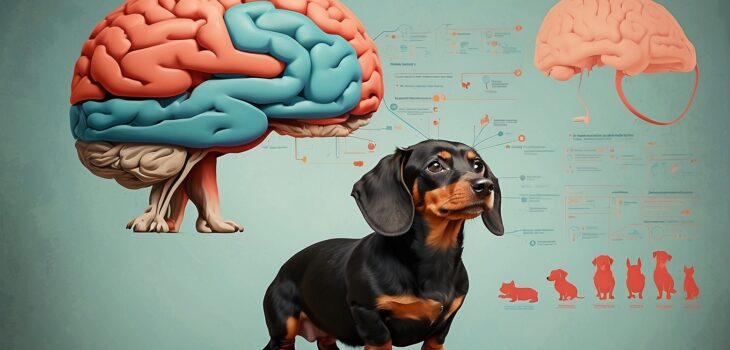Have you ever wondered just how big a Dachshund’s brain is? Well, let’s dive into the intriguing world of these lovable canine companions and uncover the secrets behind their noggin’s size. As one of the most popular dog breeds, Dachshunds are known for their long bodies and iconic sausage-like shape. But what about their brains? In this article, we will explore the fascinating dimensions of a Dachshund’s brain and discover how it contributes to their unique behaviors and characteristics. Get ready to have your curiosity satisfied as we take a closer look at the size of a Dachshund’s brain and the wonders it holds.
Overview of Dachshunds
Brief background about Dachshunds
Dachshunds, also known as wiener dogs or sausage dogs, are a small breed that originated in Germany. They were originally bred for hunting purposes, particularly for tracking and retrieving prey. Dachshunds have a long body, short legs, and a distinct elongated shape which allows them to maneuver through tunnels and burrows. Today, they are popular companion dogs known for their loyalty and lively personality.
Physical characteristics of Dachshunds
Dachshunds come in two sizes: standard and miniature. Standard Dachshunds typically weigh between 16 and 32 pounds, while miniature Dachshunds weigh around 11 pounds or less. They have a long, muscular body, a well-developed chest, and short legs. Their distinctive features include a long snout, expressive eyes, and floppy ears. Dachshunds have a variety of coat types, including smooth, wirehaired, and longhaired.
Temperament and intelligence of Dachshunds
Dachshunds are known for their lively and curious nature. They are generally friendly and affectionate dogs, although they can be stubborn at times. Dachshunds are intelligent and have a keen sense of smell, which makes them excellent trackers. They are also known for their bravery and will fearlessly take on much larger animals. While they can be independent, Dachshunds are also loyal and thrive on human companionship.

Understanding Canine Brain Sizes
Explanation of brain size in relation to canine intelligence
The size of a dog’s brain is often believed to be correlated with their intelligence. However, it is important to note that brain size alone does not determine a dog’s intelligence. The brain’s structure and the number of neurons it contains also play a significant role in determining cognitive abilities. Additionally, other factors such as genetics and upbringing can influence a dog’s intelligence.
Differences in brain size among different dog breeds
Dog breeds vary in terms of brain size. Some breeds, such as the Chihuahua or the Yorkshire Terrier, have relatively small brains compared to larger breeds like the German Shepherd or Labrador Retriever. However, it is important to remember that brain size should not be the sole criteria for measuring intelligence, as different breeds excel in different areas of canine cognition.
Factors influencing brain size in dogs
Several factors can influence the size of a dog’s brain. Genetic factors, including breed heritage, play a significant role. Additionally, prenatal nutrition and environmental stimuli during a dog’s early development can impact brain size. Mental stimulation and training throughout a dog’s life can also contribute to the development and overall health of their brain.
Size of a Dachshund’s Brain
Average brain size of a Dachshund
The average brain size of a Dachshund is relative to their body size. While they are a small breed, they do not have significantly smaller brains compared to other breeds of similar proportions. Dachshunds have a relatively large brain for their size, enabling them to possess cognitive abilities comparable to larger breeds.

Comparison of Dachshund brain size to other dog breeds
When comparing the brain size of Dachshunds to other breeds, it is important to consider their body size. Dachshunds have proportionally sized brains, allowing them to exhibit intelligence and problem-solving skills similar to other dogs of their weight category. While they may not have the largest brains among all breeds, Dachshunds are by no means lacking in mental capacity.
Specific characteristics of a Dachshund’s brain
Dachshunds have a well-developed olfactory center in their brains, which contributes to their exceptional sense of smell. This keen olfactory sense is what makes them efficient hunters and trackers. Additionally, Dachshunds have a strong auditory processing center, allowing them to react quickly to sounds and communicate effectively with their owners.
The Link Between Brain Size and Intelligence
Debunking the myth of brain size and intelligence correlation
Contrary to popular belief, brain size alone is not the sole determinant of intelligence in dogs. While larger brains may have the potential to contain more neurons, other factors such as neuronal density and brain structure can play a more significant role in determining cognitive abilities. Therefore, it is important not to make assumptions about a dog’s intelligence solely based on their brain size.
Other factors influencing canine intelligence
Several factors beyond brain size can influence a dog’s intelligence. Genetics and breed heritage play a significant role, as certain breeds have been selectively bred for heightened intelligence in specific tasks. Additionally, a dog’s upbringing, socialization, and training also impact their cognitive abilities. Regular mental stimulation and positive reinforcement training techniques are essential for nurturing a dog’s intelligence.
Studies on Dachshund intelligence
While there is limited research specifically focused on Dachshund intelligence, anecdotal evidence suggests that they are intelligent dogs. Dachshunds have been successfully trained for various tasks and activities, and their problem-solving abilities have been demonstrated in different settings. Their sharp instincts and quick learning abilities make them capable companions for various tasks.
Cognitive Abilities of Dachshunds
Learning and problem-solving abilities of Dachshunds
Dachshunds are known for their quick learning abilities and problem-solving skills. They have a natural curiosity and enjoy mentally stimulating tasks. With proper training and positive reinforcement, Dachshunds can quickly grasp new commands and tricks. Their intelligence and adaptability make them well-suited for obedience training and various canine sports.
Dachshund’s aptitude for specific tasks or activities
Due to their hunting heritage, Dachshunds have naturally developed talents for tracking scents and burrowing. Their exceptional sense of smell allows them to excel in activities such as scent work and nose work. Additionally, Dachshunds can participate in agility courses, obedience trials, and even therapy work, showcasing their versatility and cognitive abilities.
Examples showcasing the cognitive abilities of Dachshunds
Dachshunds have been trained to perform a wide range of tasks, demonstrating their cognitive abilities. They can learn to fetch specific objects, identify scents, and even solve puzzles designed to challenge their problem-solving skills. These intelligent dogs can also be trained for various tricks, agility courses, or specialized roles, such as search and rescue or assistance work.
Training and Mental Stimulation for Dachshunds
Importance of training and mental exercises for Dachshunds
Training and mental exercises are crucial for the overall well-being and happiness of Dachshunds. As intelligent dogs, they thrive on mental stimulation and require activities that engage their minds. Regular training sessions not only help develop their obedience skills but also provide mental challenges and strengthen the bond between the owner and the dog.
Recommended training techniques for Dachshunds
Positive reinforcement training techniques are highly recommended for Dachshunds. These techniques involve rewarding desired behaviors with treats, praise, or play. Dachshunds respond well to positive reinforcement, as they are eager to please their owners. Consistency, patience, and short training sessions are key to effectively training a Dachshund.
Engaging activities to stimulate a Dachshund’s brain
To provide ample mental stimulation, owners can engage their Dachshunds in various activities. Puzzle toys that require problem-solving skills can keep their minds active. Scent work games or hiding treats around the house encourage their natural tracking abilities. Agility courses, obedience training, and interactive play sessions also help keep their brains engaged and their bodies active.
Behavioral Traits Associated with Brain Size
Exploring behavioral traits commonly found in dogs with smaller brains
While brain size alone does not dictate behavior, certain behavioral traits are more commonly found in breeds with smaller brains. These traits may include a higher tendency for separation anxiety, aggressive behavior, or difficulty with impulse control. However, it is important to remember that individual temperament and upbringing have a significant influence on a dog’s behavior, and not all dogs with smaller brains will exhibit these traits.
How brain size affects a Dachshund’s behavior
Dachshunds may exhibit some behavioral characteristics associated with their smaller brain size. They can be prone to separation anxiety and may become overly attached to their owners. Dachshunds can also display territorial or possessive behavior due to their protective nature. However, proper training and socialization from an early age can help mitigate these behavioral tendencies and establish a well-rounded temperament.
Potential implications for Dachshund owners
Understanding the potential behavioral implications associated with brain size can help Dachshund owners better address their dog’s needs. Owners should prioritize proper socialization, positive reinforcement training, and providing mental stimulation to prevent the development of behavioral issues. A well-trained and mentally stimulated Dachshund is more likely to exhibit balanced behavior and be a happy companion.
Health Issues and Brain Size in Dachshunds
Understanding potential health concerns related to brain size
While brain size itself is not a direct indicator of health issues, certain health concerns can be more prevalent in breeds with smaller brains, including Dachshunds. For example, the shape of their elongated spine puts them at a higher risk of intervertebral disc disease. Owners should be aware of these potential health issues and take necessary precautions to promote overall well-being.
Brain-related disorders seen in Dachshunds
Dachshunds may also be prone to certain brain-related disorders. Examples include epilepsy, a neurological disorder characterized by recurring seizures, and hydrocephalus, a condition where there is an excess accumulation of cerebrospinal fluid in the brain. Regular veterinary check-ups, a balanced diet, and appropriate exercise can help minimize the risk or manage these conditions in Dachshunds.
Tips for maintaining a healthy brain in Dachshunds
To maintain a healthy brain in Dachshunds, proper nutrition is essential. Providing a balanced diet that includes essential nutrients such as omega-3 fatty acids can support brain health. Regular exercise helps promote overall blood circulation and mental well-being. Owners should also remain vigilant for any changes in behavior or health and seek veterinary advice promptly to address any potential brain-related issues.
Promoting Brain Health in Dachshunds
Dietary considerations for optimal brain function in Dachshunds
Feeding a high-quality, balanced diet rich in essential nutrients is crucial for promoting optimal brain function in Dachshunds. Omega-3 fatty acids, found in fish oil or certain dietary supplements, can support brain health. Antioxidant-rich foods, such as fruits and vegetables, can also help protect the brain from oxidative stress. Consulting with a veterinarian for specific dietary recommendations is advisable.
Exercise and mental stimulation for brain health
Regular exercise and mental stimulation are key components of maintaining a healthy brain in Dachshunds. Physical exercise not only keeps their bodies fit but also promotes blood circulation to the brain. Engaging in mentally stimulating activities, such as puzzle games, learning new tricks, or scent work, helps keep their minds sharp and wards off boredom and behavioral issues.
Regular check-ups and early detection of brain-related issues
Routine veterinary check-ups are essential for monitoring a Dachshund’s overall health, including their brain function. Periodic examinations and screenings can help detect any potential brain-related issues at an early stage, allowing for timely intervention. Regular vaccinations and preventive measures against common health concerns, such as tick-borne diseases, are also crucial for maintaining optimal brain health.
Conclusion
Summary of key points about Dachshund brain size
The brain size of a Dachshund, while relative to their body size, does not limit their intelligence or cognitive abilities. Dachshunds are intelligent and adaptable dogs, capable of learning and problem-solving. Their unique physical characteristics, including a well-developed olfactory center, contribute to their exceptional skills in tracking and hunting.
Appreciating the unique characteristics of Dachshunds
Dachshunds possess a distinct combination of physical and mental qualities that make them a beloved breed. Their long bodies and short legs are an iconic feature, while their lively temperament and loyalty endear them to their owners. Understanding their individual needs and providing appropriate training and mental stimulation is crucial for nurturing their intelligence and ensuring their overall well-being.
Final thoughts on understanding and caring for a Dachshund’s brain
While brain size may be an interesting aspect to explore, it is important to remember that a Dachshund’s intelligence is not solely determined by their brain size. Positive reinforcement training, mental stimulation, and providing a nurturing environment are vital for unlocking their full potential. By appreciating the unique characteristics of a Dachshund and offering them the care they deserve, owners can ensure a fulfilling and enriched life for their beloved furry friend.




